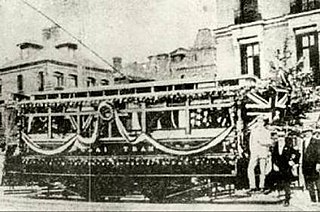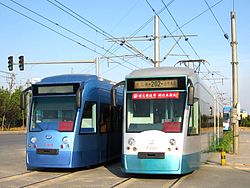Top Qs
Timeline
Chat
Perspective
Trams in China
From Wikipedia, the free encyclopedia
Remove ads
Several cities in China had tram systems during the 20th century. By the end of the century, only Dalian and Changchun remained extant.[1] However the 21st century has seen a resurgence in tram transport systems as China attempts to combat with urban traffic congestion and pollution.

Dalian historical tram. Its use is still preserved to date in limited area in the city.
Dalian modern tram. Tram type DL6WA, mark Dalianren (meaning "Dalian people") manufactured by Tram Factory of Dalian Public Transport Group. The blue one is manufactured in 2009, the other in 2001–2003.

Remove ads
List of historical tram systems
- Beijing had the first tram system in China. It opened in 1899 and connected Majiapu Railway Station to the south gate of the city. Trams were phased out 1958 to 1959.
- Fushun, Liaoning had a tram system circa 1902, operated by the Manchurian Railway Company with 26 trams.
- Tianjin city, had a tram system that opened in 1906. By 1933 it had 9 miles of track and operated 116 tramcars. It was closed by 1972.
- The Changchun tramway system started operations in 1942. By the 1950s the system covered 28 km (17 mi) with 98 cars. The system continues to operate today.
- In Shanghai there were three tram systems - two operated by the colonial powers of Britain and France and one by a Chinese company. The British system opened in 1908 and was the largest of the three. It had 7 lines and ran 216 tramcars. The British system merged with Chinese system in 1952. The French system opened the same year and its 3 lines ran 60 tramcars. Like the British it merged into the Chinese system in 1953. The Chinese system opened in 1913 and operated 52 tramcars over 4 lines of some 23.5 km (14.6 mi) in length. The last tram services ended in 1975.
- In Shenyang, Liaoning, a Japanese owned electric tramway opened in 1925 and replaced an earlier horse-drawn tram system that dated from around 1907.[2] By 1937 it had expanded to cover 12 km (7.5 mi) of track and ran 21 tramcars. It was finally closed in 1973.
- Harbin, Heilongjiang had a system from 1927 with 8 lines and about 40 trams. The system closed in 1987.
- The city of Anshan, Liaoning, had a single tram line from 1956 till the late 1990s and the track was dug up in 2006.
- Dalian, Liaoning opened its first tram line on September 25, 1909. It was operated by South Manchuria Railway. By 1945, the system had 11 lines. Today 2 lines remain in operation covering 23.4 km (14.5 mi). The system is in the process up being updated with a mixture of old tram cars and new modern low floor cars in operation.
Remove ads
New tram systems
Summarize
Perspective
Tianjin and Shanghai have recently introduced rubber tired trams for their TEDA Modern Guided Rail Tram and Zhangjiang Tram respectively, but unfortunately both of these networks are closed now. However Shanghai has also reintroduced steel wheel tram system in Songjiang area.
In 2011, Shenyang city decided to construct a new tram network to complement its new metro network. The first three lines of the new system were opened on August 15, 2013.[3][4] A year later, Nanjing opened the new Hexi trams just before the 2014 Youth Olympics. Since them new tram systems opened in a number of cities in China such as Qingdao, Guangzhou, Shenzhen, Suzhou, Zhuhai, Wuhan, Huai'an and Beijing.
Ridership
According to an expert affiliated with the Ministry of Transport, some of the newly constructed tram networks were built without considering the suitability of this mode of transportation well, leading to low-passenger numbers due to the tram lines serving less-densely populated outskirts, slow operating speeds and with unrecoverable operating costs.[5] Some tram systems are built primarily to promote tourism, rather than filling a transportation niche and have been called white elephant projects, such as the Delingha Tram. Other tram systems have been more successful, such as the Huai'an Tram, Beijing's Xijiao line and Haizhu Tram.[6]
- The TEDA tram opened in 2007 (closed in 2023)
- The Zhangjiang tram opened in 2010 (closed in 2023)
- Shenyang Modern Tram opened in 2013
- Nanjing Hexi Tram
- Huai'an Tram
- Chengdu Tram Line 2
Remove ads
Light rail/Tram systems
Summarize
Perspective
- Legend
- In operation.
- Under test run.
- Out of service
Under construction
- Baoshan
- Chongqing
- Tongliang Guided Rail Tram[17]
- Delingha
- Guangzhou
- Huangpu Tram Line 2, Line 5
- Guiyang
- Jiaxing
- Tram T2[18]
- Lijiang
- Lijiang Tram Line 1
- Turpan
- Xi'an
- Xi'an High-tech Zone Tram (西安高新区有轨电车)[19]
- Zhangye
Suspended
Lanzhou New Area planned a 5-line modern tram network[20] but construction was halted in 2017 due to newly imposed restraints on borrowing.[21]
Planned
- Nanjing
- Nanjing Jiangxinzhou Tram (南京江心洲有轨电车)
- Tianjin (Xiqing Tram T2)[22]
- Zhuzhou Tram (株洲有轨电车)
Lhasa,[23] Haikou, Quanzhou,[24] Zhengzhou, Kunshan,[25] Baotou, Korla,[25] Anshun,[25] Hangzhou,[26] Changzhou,[26] Taizhou[27] and Huangshan[28] are planning tram networks for the future.
Remove ads
See also
Notes
References
Wikiwand - on
Seamless Wikipedia browsing. On steroids.
Remove ads








